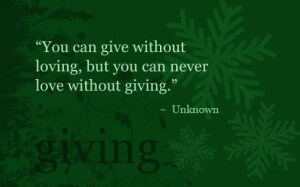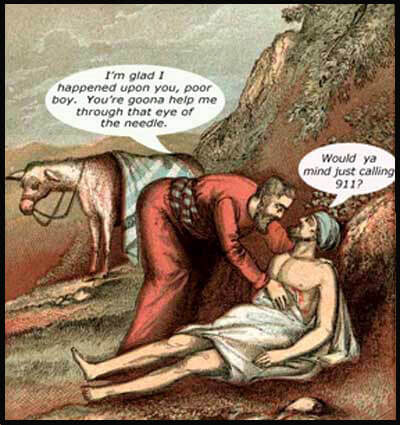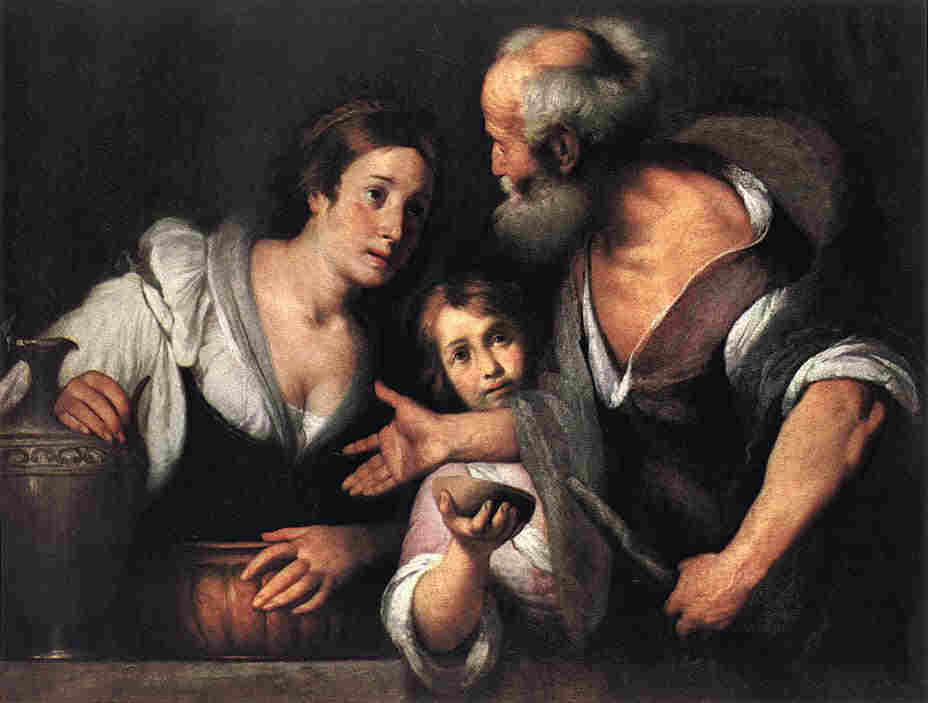-
The Well-Tempered Giver
 Most of us treat compassion and giving as a happenstance. It isn’t something we plan, but we can be expected to do the right thing when it comes along. It is interesting that one of the most poignant passages on the giver, Psalm 41:1-3, treats giving in a different way. “How blessed is he who considers the helpless; The LORD will deliver him in a day of trouble. The LORD will protect him and keep him alive, And he shall be called blessed upon the earth; And do not give him over to the desire of his enemies. The LORD will sustain him upon his sickbed; In his illness, You restore him to health.”The focus of the psalm is on the blessings the giver will receive. But in describing giving, the Hebrew doesn’t speak of giving as an event, or even as a regular practice, but as a discipline. The one who is blessed isn’t the one who throws some change at a beggar, but the one who considers, meditates, spends time in mindful consideration for the benefit of the poor. In other words, this verse is speaking about the person who makes plans for giving, who considers what is the best way to do well for the poor.Giving is not a series of onetime events, but it is an ongoing action that we can be trained to do well. It is not happenstance, but a spiritual discipline that we can develop. Maimondes, the Jewish scholar and theologian of the middle ages spoke of a development of giving charity, that one could increase in perfection of the discipline of giving by going up eight levels. (These levels can be seen here: http://www.chabad.org/library/
Most of us treat compassion and giving as a happenstance. It isn’t something we plan, but we can be expected to do the right thing when it comes along. It is interesting that one of the most poignant passages on the giver, Psalm 41:1-3, treats giving in a different way. “How blessed is he who considers the helpless; The LORD will deliver him in a day of trouble. The LORD will protect him and keep him alive, And he shall be called blessed upon the earth; And do not give him over to the desire of his enemies. The LORD will sustain him upon his sickbed; In his illness, You restore him to health.”The focus of the psalm is on the blessings the giver will receive. But in describing giving, the Hebrew doesn’t speak of giving as an event, or even as a regular practice, but as a discipline. The one who is blessed isn’t the one who throws some change at a beggar, but the one who considers, meditates, spends time in mindful consideration for the benefit of the poor. In other words, this verse is speaking about the person who makes plans for giving, who considers what is the best way to do well for the poor.Giving is not a series of onetime events, but it is an ongoing action that we can be trained to do well. It is not happenstance, but a spiritual discipline that we can develop. Maimondes, the Jewish scholar and theologian of the middle ages spoke of a development of giving charity, that one could increase in perfection of the discipline of giving by going up eight levels. (These levels can be seen here: http://www.chabad.org/library/article_cdo/aid/45907/jewish/ )Eight-Levels-of-Charity.htm  I suggest a different approach to self-training oneself in discipline. I recommend that our giving be heading toward a goal, like we would train in a gym toward a certain weight. The goal that we have in our giving is not a certain amount, but is love. Paul said, “If I give away all that I possess to feed the poor… but do not have love, it profits me nothing.” This means that giving in and of itself isn’t the goal of giving—rather that giving is a means toward the goal of love. It doesn’t mean that giving has nothing to do with love—rather, love and giving can be deeply connected. But giving can be done without love, and that is a useless act. Giving for the purpose of loving, however, is one of the greatest acts in the world.Does this mean that we should not give unless it is with love? What if our motivation is mixed? What if we don’t know what giving in love looks like? What if we tried to love, but it didn’t turn out to be love? Like any discipline, giving with love takes time and practice. To achieve the goal of giving with love, we must give for a while without knowing what we are doing. If we are following God’s spirit, we will eventually learn the path of giving with love. First, however, we must give. If we do not give, we will not eventually learn how to give in love. But we also must not be satisfied with our giving until we have achieved our goal. Even when seeking that ideal weight at the gym, we must not quit because the task is hard. Instead, we listen to our trainer, and keep at our program until the goal is achieved. Even so with giving in love: that is our goal, we must keep giving—making mistakes along the way—listening to God’s Spirit and persisting until we reach the goal.
I suggest a different approach to self-training oneself in discipline. I recommend that our giving be heading toward a goal, like we would train in a gym toward a certain weight. The goal that we have in our giving is not a certain amount, but is love. Paul said, “If I give away all that I possess to feed the poor… but do not have love, it profits me nothing.” This means that giving in and of itself isn’t the goal of giving—rather that giving is a means toward the goal of love. It doesn’t mean that giving has nothing to do with love—rather, love and giving can be deeply connected. But giving can be done without love, and that is a useless act. Giving for the purpose of loving, however, is one of the greatest acts in the world.Does this mean that we should not give unless it is with love? What if our motivation is mixed? What if we don’t know what giving in love looks like? What if we tried to love, but it didn’t turn out to be love? Like any discipline, giving with love takes time and practice. To achieve the goal of giving with love, we must give for a while without knowing what we are doing. If we are following God’s spirit, we will eventually learn the path of giving with love. First, however, we must give. If we do not give, we will not eventually learn how to give in love. But we also must not be satisfied with our giving until we have achieved our goal. Even when seeking that ideal weight at the gym, we must not quit because the task is hard. Instead, we listen to our trainer, and keep at our program until the goal is achieved. Even so with giving in love: that is our goal, we must keep giving—making mistakes along the way—listening to God’s Spirit and persisting until we reach the goal. -
Should We Give to the Poor?
 We all know the situation: We are driving on a freeway offramp or near a busy intersection and there is a guy or gal holding a sign. Sometimes the sign is funny, like the old guy who has the sign “Allergic to Jail, Too Ugly to Prostitute”; sometimes simple “A coin will help”; sometimes direct, “Need money for a room tonight.”
We all know the situation: We are driving on a freeway offramp or near a busy intersection and there is a guy or gal holding a sign. Sometimes the sign is funny, like the old guy who has the sign “Allergic to Jail, Too Ugly to Prostitute”; sometimes simple “A coin will help”; sometimes direct, “Need money for a room tonight.”And I am sure that we have all, at times, considered about the wisdom to give to these bold sign-holders. If we give them money, are we helping or hurting them? Will they use it on beer or drugs (some signs clearly tell you they will), will they ever improve themselves? Is it right to give to them? What if they look healthy or strong, should we just tell them to get a job?
I have discussed how we should give to beggars elsewhere (https://hogansheroesfanclub.com/beggars-and-sign-holders/ ) but today I am asking a deeper question: should we give at all? Is it wise to give? Recently, an excellent book has been making the rounds called When Helping Hurts. The title alone begs the question: Even though I want to be generous, is my giving actually helping or hurting? And it makes us doubt whether giving outside of our own congregation is wise at all.
Certainly there are kinds of giving that harm others. If we give a drug addict a thousand dollars, we shouldn’t be surprised if we find that person dead in less than a week. A documentary filmmaker granted a homeless man a hundred thousand dollars one time to film him and see what he did with the money. After the money was almost gone, the man regretted ever finding the money and ended up homeless again, content with his daily recycling regimine (http://en.wikipedia.org/wiki/Reversal_of_Fortune_(2005_film) ).
But does this mean giving to the poor of any kind is a mistake? No matter what economists or politicians might say, the Bible makes it clear that giving is important for all who want to serve God.
Giving is a command
All throughout Scripture giving is something that is expected of God’s people. Abraham provided an example of generous giving; Moses commanded giving generously to those in need; Jesus commanded generous giving to the poor of all his disciples; James spoke about giving as being a sign of faith; John spoke of giving as a sign of love; Paul commanded the wealthy to be generous. If there is one action that is commended consistently throughout all the Bible, it is giving.
 Giving benefits us before God
Giving benefits us before God
The one who gives to the poor is blessed greatly before God. It says in scripture that the one who gives to the poor will be delivered from sickness and their enemies (Psalm 41:1-3). The book of Proverbs says that the generous shows honor to God (14:31), and that God will repay them for their work (19:17).
Giving is an act of love
The primary act of love is giving. There are certainly ways to give without love (we will discuss those in later posts), but if we do not ever give to those in need, then we can safely say that we do not love those in need. John says this clearly: “Whoever has the world’s goods, and sees his brother in need and closes his heart against him, how does the love of God abide in him?” (1 John 3:17) What John is saying is that we cannot express our love to those in need without giving to their need. If we truly will love our neighbor, at least part of the expression of that love will be in giving.
Not giving harms us eternally
In the end, although giving unwisely might cause some harm, not giving causes more harm. The one who refuses to give to the poor will be denied help from God, no matter how much they pray (Proverbs 21:13). To deny help to another is a sin (Proverbs 14:21). Even more severely, Jesus associates eternal life with the devil and his angels with refusing to give to those in need (Matthew 25:41-46).
If we desire any of God’s blessings, not giving isn’t really an option. Giving is a foundational discipline in living a life before God.
However, this doesn’t mean that God doesn’t want us to give wisely. Not all giving has the same benefit. So the next few posts will discuss the manner in which we should give.
-
Faith in Crisis
When you become a Christian God automatically enrolls you in to the prestigious of the Holy Ghost University. It is a place where the Holy Spirit teaches both in and through the written word of God and then also the hands on experience. In the world they call it the Lab but in Christendom it is called Trials and Tribulations.
Now we have all heard the stories of how a person or a couple through no fault of their own ended up losing all that made them secure. Their home and belongings and their pets and ……well everything. And this is presented in about 20 to 30 seconds of air time on the local news or a documentary that is usually dealing with a different issue altogether and so the story gets lost in the presentation. In my ministry I have listen to probably 100s of such stories. But, because I lived in a house and was not facing spending time on the streets or losing all *MY* stuff it never really impacted me.
But now my wife and I are looking down the barrel of that gun so to speak. The house that we have been living in for many years is going to be sold and we are finding out that we do not have anywhere we can afford to move to.All the stories that we who are housed tend to ignore about the shortages of housing or the paranoia of landlords with their extensive and expensive application background forms are true. For an example they want an application for each adult and each application carries a fee of $30 to $50 on average and if you are not approved you lose the money. A house the same size as what we have starts around $1200 to $1500 per month so when the rent exceeds your income by $200 per month or you can’t afford all the hoops then you get to enter into faith building time by getting on your knees and doing a whole lot of praying at a much deeper level.
Now let us make something clear here. I am not posting this to pluck at your heart strings and make you feel sorry about us in the vain hope that you would pour out a ton of money or anything like that. As an urban missionary, part of my mission is to expand your understanding of the height and depth and breadth of the Kingdom of God. I also write to demonstrate the power and glory of our Lord and our Father. So what I am doing right now is setting the stage (so to speak) so that when the Lord comes and rescues us out of this situation that you will be able to marvel and rejoice equally with us. Then you will know where we started from, how we walked through the trial and how the deliverance came to pass. That is my purpose and hope…….
That is not to say that if one of you showed up on our door step with the keys and title to a spacious mansion that I would turn my nose up at it either!! I might be crazy but I am not stupid….;~P
So that is where we are on our journey so far.The Lord’s hand is in this….I have felt in my spirit that we, Yvan and I were going to embark on a journey together for some years now, but I could not see how it could be brought to pass. Well this is how…I guess!
My the Lord Bless you and keep you and give you peace.
Faithwalker -
Kingdom Hope for the Poor
 This article was first posted on the Mustard Seed Associates blog.
This article was first posted on the Mustard Seed Associates blog.
There is an emphasis in most congregations about responsibility. Taking personal responsibility for our actions is a key essence of basic teaching on repentance and forgiveness. Unless we recognize what we are responsible for, the ways that we have “missed the mark” we cannot possibly comprehend how God can grant us grace to restore us to righteousness.
In our society it is a maxim (a whole profession, in some cases) to avoid responsibility. Corporations are built on reducing responsibility, insurance companies focus on reducing liability, every public apology is seen as an admission of responsibility and so no one apologizes because no one wants to clean up the mess. This comes out in daily life, where if a crisis occurs, then many fingers are set to blame, to avoid the finger being pointed at themselves.
In the majority of our society, including the church, when we discuss responsibility of poverty the fingers all point in one direction: toward the poor themselves.
- “The poor are lazy” say many
- “The poor are immoral, addicts, self-destructive.”
- “The poor lack faith” say some more spiritually-minded.
While the Bible recognizes responsibility of the poor for their poverty in some cases, the focus of the Bible is on a different aspect.
In the Bible there is a strong theme that is associated with the Hebrew word “shalom”. Shalom is usually translated “peace” but it means more than simple lack of conflict. It means being a part of a community of peace, which not only mediates conflict, but also provides for each single or family unit what they need to create a context of peace.
In the Mosaic Law, shalom is achieved not only by establishing a relationship with the Lord, but also in providing each family land, and a system of assistance for those who are impoverished.* In the prophets, shalom is promoted by providing justice for those who might otherwise not have authority to enforce justice on their own. They also promised the coming King who would establish shalom and give perfect balance to the poor and the animal kingdom (Isaiah 11:1-9).
Jesus promoted shalom by healing the sick, raising the dead and releasing those oppressed by spirits. Jesus made sure that those who were artificially separated from God had an opportunity to participate in community. He taught a law of love, which included giving generously to the needy. And Jesus taught God’s plan to take the very lowest and to make them rulers over His kingdom.
The early church continued Jesus’ program of shalom by providing for all the needy of their churches, and, if they had more resources, for those who were not a part of the church. They accepted the Samaritans and Gentiles into their fold and loved even their enemies so that God’s grace might be known to all.
 When the Bible answers the question, “Who is responsible for the poor, the outcast, the hungry, the needy?” the answer rings out loud and clear: “We all are.” We have no right to point to the poor and claim that they are responsible for their own demise, even if it partly true. Rather, we are responsible to provide assistance and love, because it is what Jesus would do. The poor are responsible to provide their part. It is our responsibility to provide hope.
When the Bible answers the question, “Who is responsible for the poor, the outcast, the hungry, the needy?” the answer rings out loud and clear: “We all are.” We have no right to point to the poor and claim that they are responsible for their own demise, even if it partly true. Rather, we are responsible to provide assistance and love, because it is what Jesus would do. The poor are responsible to provide their part. It is our responsibility to provide hope.What are the needs in your congregation?
Don’t label any of your congregation “poor”, but ask people if they have any needs and what they are. Then give “without the right hand knowing what the left hand is doing”, anonymously and generously to those who have need in the congregation, whether food, help with utilities, rent or babysitting. Make a committee that will regularly seek out and meet the needs of the congregation.What are the needs of your neighborhood?
Try to find out the poorest areas of your neighborhood. Perhaps it is a large section in an urban area, perhaps it is a single apartment building, perhaps it is an urban “skid row”, or perhaps the poor are spread through a large area. Find out what resources are available for the needy in your area. You might discover this by speaking to other congregations or by contacting a local service organization. Make those resource contacts available to whatever needy come your way.What other congregations are creating shalom?
As an individual or a congregation, you cannot meet all the needs yourself. But you can focus on one aspect, and meet that. Some projects may be done by one congregation, others require multiple congregations to work together. But don’t be alone. To meet the needs of the poor in your area is like a puzzle. You may be one piece of the puzzle, or you may be part of a clump of pieces that meet a particular need, but many congregations (and secular agencies) are necessary to fill out all the puzzle, to meet all the needs of the poor.Shalom isn’t the responsibility of one person, but of the entire body of Christ.
If you want to read more about shalom in the Bible, read these essays.
I also recommend reading Ron Siders’ book, Cry Justice: The Bible on Hunger and Poverty and Walter Brueggeman’s, Living Toward a Vision: Biblical Reflections on Shalom
*Some of these systems are demands to provide monetary assistance to poor farmers (Deut. 15), gleaning the edges of fields (Lev. 19:10), two tithes that include the poor (Deut. 14:22-29), and specific commands to give justice to widows, orphans, immigrants and those in debt (Exodus 22:21-27).
-
The Chaos Monster
 This was shared by my friend, Pastor Ron Clark.
This was shared by my friend, Pastor Ron Clark.Time to vent a little. This is for my friends who believe that the poor, homeless, and jobless need to just “get a job” and quit asking for help.
Today I went with one of our guys who was homeless, went through a shelter program, has a caseworker, and now lives in an apartment on government assistance. I went with him because he has short term memory, is an older man, and can’t hear well. He feels that the apartment managers are angry with him. There was a problem with his social security this month. He now has no money to pay rent. Rent is $35, and with the $8 late fee it is $43.
We went to pay his bill. They don’t take a third party check, even from a church. They don’t take cash. He doesn’t have a bank account yet because he doesn’t have enough credit yet. We went to get a cashier check from my bank, which was $5. I was told that they send people to that bank to get cashier’s checks. All in all in order to pay rent we have walked 3 miles and paid extra money. I guess it was a good thing we were there to help.
One mistake increased his rent payment by 33%.
I learned something walking with this guy today. I learned that everybody ought to walk this walk with this guy. For those that think the simple solution for people on the street is to get a minimum wage job and get into an apartment, I suggest you walk with this guy. And this guy was lucky (really he is not but his circumstances may work to his advantage) he had an addictive history–so he has more resources. It was frustrating for me because the whole thing doesn’t make sense, even though it makes sense?
I understand why the apartment does what they do, but I also understand how those without have more obstacles to success than we realize.
The system that “helps” the needy is a monster of bureaucratic chaos. Every time you think that there is light, there is only more paperwork for those who are functionally illiterate. More miles for those who are transportationally impaired. More hurdles for those who are barely able to walk. Honestly, the poor doesn’t need more bureaucratic solutions. They need more friends who have the time to help them
This is where the church can show the love of Jesus.
3733 N Williams Ave
Portland, OR 97227
503.888.4453
AnawimCC@gmail.com
Ministry Locations and Times »











